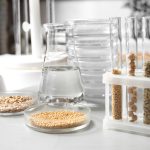SGS Crop Science Canada News: March 2024
• Dig into Insights for Soil Heath and Disease Diagnostics
• Create a Roadmap for Greenhouse and Vertical Farming Successes
• Prepare for Seed Carryover Sales with Updated Germination Testing
• Learn the Fertility Opportunities of Manure
DIG INTO INSIGHTS FOR SOIL HEALTH AND DISEASE DIAGNOSTICS
Spring is an ideal time to collect samples where fields require updated soil tests. Whether it is a new farm, one that missed fall sampling, or out of sync with the normal rotation, it is better to have current fertility data to assist in nutrient management planning.
While collecting soil for fertility testing, consider expanding your insights:
– NEW! Soil Health Package: Benchmark your soil’s health with our new package and calculations through the Soil Health Assessment and Plan (SHAP) online tool.
– Soybean Cyst Nematode: Determine presence and populations.
– Nematode Count: Find detrimental species accountable for vegetable and fruit production loss.
– Heavy Metals: Obtain permits for NASM plans with this analysis or assure suitability prior to vegetable production.
– Texture: Manage Sand-Silt-Clay composition once we determine percentage and assign classification.
PREPARE FOR SEED CARRYOVER SALES WITH UPDATED GERMINATION TESITNG
Seed inventory management starts with clear record keeping, and a keen eye on quality management. With spring seeding on the horizon, now is an ideal time to coordinate germination to ensure performance, especially those seed lots which have not been tested in the last 3 months. Calendar the following sample submission timelines for carryover seed germination:
– Spring seeded crops: February – April
– Fall seeded crops: June – July
What are the contributing factors to seed quality loss? Consider harvest weather, crop staging, seed moisture, seed temperature, storage conditions, crop type, fungal pathogens, and seed age, when scheduling your seed germinations. Don’t delay your sample submission, as test duration can be from 5-21 days!
CREATE A ROADMAP FOR GREENHOUSE AND VERTICLE FARMING SUCCESSES
Imagine a world where your greenhouses and vertical farms are thriving, bursting with life. No stress, no lost sleep and everything running as it should. . . It’s a nice thought, but we know this is usually not the case; our fragile ecosystem is susceptible to threats such as pathogen outbreaks and nutrient imbalances. When used properly, regular agricultural testing provides a recipe for success. Allowing us to always be on guard, ready to detect and tackle specific issues before they become catastrophic. A roadmap, if you will, to consider:
– Pre-season Preparedness
– Maintenance Success
In a world where precision and reliability are vital, SGS is here to work with you to create a preventative maintenance testing program specific to your operation’s unique needs. Reach out and we will work with you to design a suitable program.
LEARN THE FERTILITY OPPORTUNITIES OF MANURE
Manure storages are often nearing capacity as spring approaches, and there is urgency to apply to fields in narrow timing between when conditions are fit for application and pre-plant activities. Now that nutrients have a higher value, it is important to take a proper sample of manure to determine how much available nutrient is being applied, and to calculate the reduction in required fertilizer. Wondering what we test?
– Liquid storages
– Solid stockpiles
Agitated liquid storages and well mixed subsamples from the solid pile provide the best representation of the manure. The test report will provide not only the analytical results, but also the calculated value of available N, P2O5, and K2O per ton/tonne or 1,000 imperial gallons/litres applied. Let our laboratory staff help you with the precision needed for your targeted fertility program.





